Black History, Inventions, Science
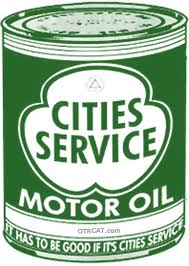 During his tenure at the Cities Service Oil Co. in the late ’60s, Ernest J. Jamieson patented four inventions on the improvement of current gasoline compositions. One invention improved hydrocarbon fuel compositions for use in internal combustion engines by adding a detergent that prevents icing and corrosion.
During his tenure at the Cities Service Oil Co. in the late ’60s, Ernest J. Jamieson patented four inventions on the improvement of current gasoline compositions. One invention improved hydrocarbon fuel compositions for use in internal combustion engines by adding a detergent that prevents icing and corrosion.
Another invention improved a hydrocarbon fuel composition by adding a X hydrocarbylacid phosphate salt that reduced icing in the carburetor and improved water tolerance, thus reducing rust and hydrocarbon content in the exhaust.
Black History, Space
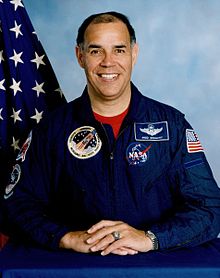
The first African-American to pilot a spacecraft.
Colonel Frederick D. Gregory was the first African-American to pilot a spacecraft.
Born January 7, 1941, in Washington, D.C. to Francis A. Gregory and Nora Drew Gregory, he graduated from Anacostia High School, in Washington, in 1958 and entered the United States Air Force Academy where he studied military engineering and received a bachelor of science degree from in 1964.
Since childhood, he had a passion for speed, racing a small aluminum boat in waters off Columbia Beach near Washington, D.C. He says, “I always wanted to fly.”
After graduating from the United States Air Force Academy in 1964, Gregory entered pilot training and attended undergraduate helicopter training at Stead Air Force Base, Nevada. He received his wings in 1965 and was assigned as an H-43 helicopter rescue pilot at Vance AFB, Oklahoma, from October 1965 until May 1966. In June 1966, he was assigned as an H-43 combat rescue pilot at Danang AB, Vietnam. When he returned to the United States in July 1967, he was assigned as a missile support helicopter pilot flying the UH-1F at Whiteman AFB, Missouri. (more…)
Black History, Government
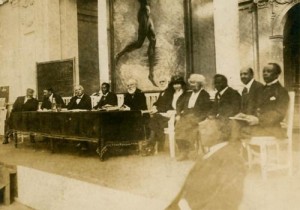
Speakers at The Pan African Congress,. Brussels, Belgium,1921
In 1919, the first Pan-African Congress was organized by W. E. B. Du Bois. There were 57 delegates representing 15 countries, a smaller number than originally intended because British and American governments refused to issue passports ro their citizens who planned on attending.[1] Their main task was petitioning the Versailles Peace Conference which was held in Paris at that time. Among their demands were that:
- The Allies should be in charge of the administration of former territories in Africa as a Condominium on behalf of the Africans who were living there.
- Africa be granted home rule and Africans should take part in governing their countries as fast as their development permits until at some specified time in the future.
The problem was that colonist offered no end in sight. Hence, the resistance and war pursued.

Black History, Inventions
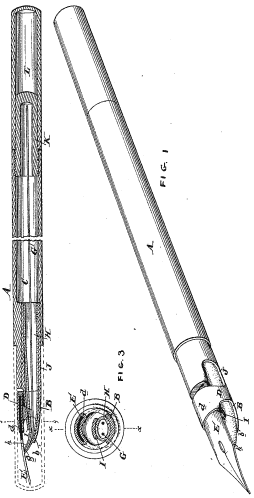
Improved Fountain Pen - patent #419,065 1/7/1890
William Purvis of Philadelphia invented and patented improvements to the fountain pen in 1890. William Purvis made several improvements to the fountain pen in order to make a “more durable, inexpensive, and better pen to carry in the pocket.”
Purvis used an elastic tube between the pen nib and the ink reservoir that used a suction action to return any excess ink to the ink reservoir, reducing ink spills and increasing the longevity of the ink. Fountain pens were first patented as early as 1809.

Bag fastener - patent #256,856 4/25/1882
William Purvis also invented several other inventions including two machines for making paper bags (which Purvis sold to the Union Paper Bag Company of New York), a bag fastener, a self-inking hand stamp, and several devices for electric railroads. His first paper bag machine (patent #293,353) created satchel bottom type bags in an improved volume and greater automation than previous machines. (more…)
Black History, Entertainment
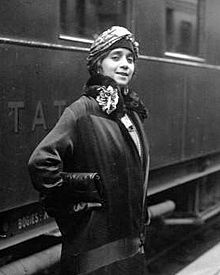
Lillian Evans Evanti
Lillian Evans Evanti (1890-1967) was the first African American to sing opera with an organized company in Europe.
In 1941 she founded the National Negro Opera.
She was born in Washington, D.C., and graduated from Armstrong Manual Training School.
She graduated from Howard University with a Bachelor’s Degree in music and studied in France and Italy. Evanti, a soprano, sang at the Belasco Theater in 1926 with Marian Anderson.
She debuted in 1927 in Delibes’s Lakmé at Nice, France. As an opera singer and concert artist, she toured throughout Europe and South America.
- In 1943, she performed with the Watergate Theater barge on the Potomac River. In 1944, she appeared at The Town Hall (New York City). She received acclaim as Violetta in Verdi’s La traviata as produced by the National Negro Opera Company in 1945.
- In 1963, she walked with her friend Alma Thomas in the March on Washington.
 During his tenure at the Cities Service Oil Co. in the late ’60s, Ernest J. Jamieson patented four inventions on the improvement of current gasoline compositions. One invention improved hydrocarbon fuel compositions for use in internal combustion engines by adding a detergent that prevents icing and corrosion.
During his tenure at the Cities Service Oil Co. in the late ’60s, Ernest J. Jamieson patented four inventions on the improvement of current gasoline compositions. One invention improved hydrocarbon fuel compositions for use in internal combustion engines by adding a detergent that prevents icing and corrosion.




